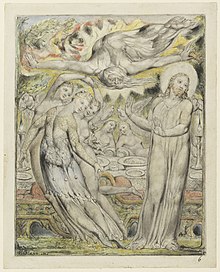Paradise Regained
Satan tells his demons of the challenging temptation ahead, dismissing Belial's honey trapping suggestion due to his belief in pride's strength.
Satan flatters Christ's wisdom but taunts his lack of achievement compared to Alexander the Great at 30.
Satan suggests alliances and freeing the Ten Tribes, but Christ chooses divine providence.
Modern editors believe the simpler style of Paradise Regained evinces Milton's poetic maturity.
This is not to say that the poem bears no affinities with Milton's earlier work, but scholars continue to agree with Northrop Frye's suggestion that Paradise Regained is "practically sui generis" in its poetic execution.
Satan, too blind to see any non-literal meanings of the term, offers Christ food and various other temptations, but Jesus continually denies him.
An anecdote recounted by a Quaker named Thomas Ellwood provides some insight into Paradise Regained's development.
Hearing this, Milton at first "sat some time in a muse" before changing the subject; however, sometime thereafter he showed to Ellwood a new manuscript entitled Paradise Regained.


